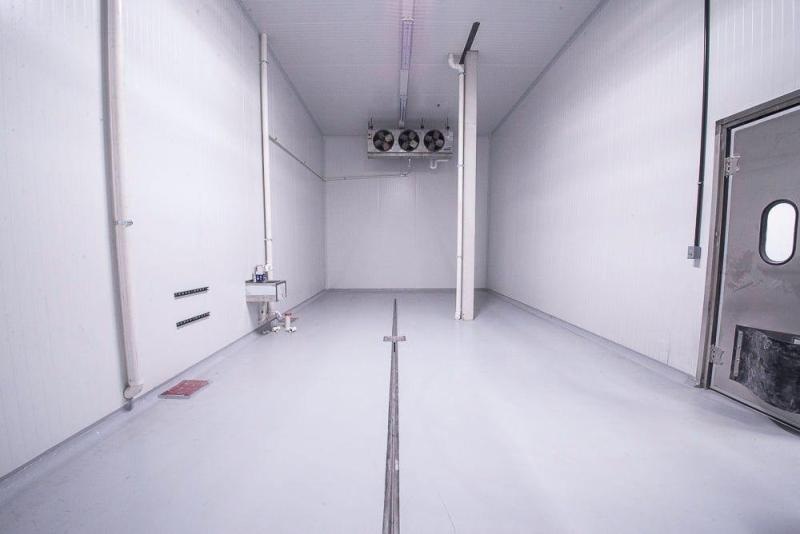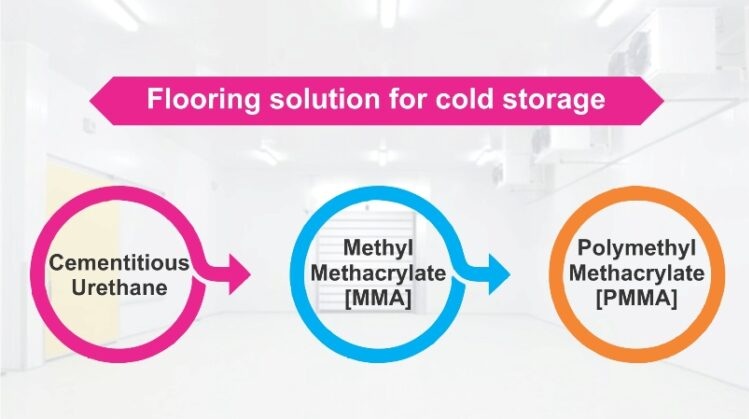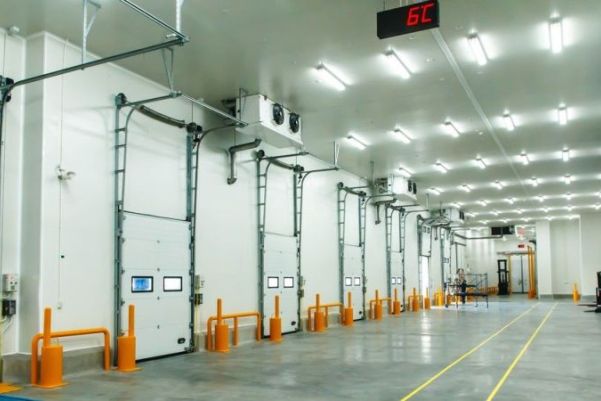The right flooring solution is a critical factor for the workability of cold storage due to a combination of stresses that the floor will have to withstand. The flooring solution must be able to handle the freezing temperatures without weakening or cracking and maintain a hygienic environment. They must withstand extreme temperatures and must be thermal shock and cycling resistant. Other considerations that need to be factored in include point loading, impacts, foot traffic, MHE movement, slip-resistance and chemical exposure. The floor finishes should be designed and constructed to be as joint-free as possible. Joints tend to trap dirt and bacteria and can be vulnerable points for mechanical loading and abrasion. If the floor in a cold storage facility can not handle these requirements it is likely to crack and wear, which would compromise the functionality of the facility.
There are different flooring requirements for cold storage facilities such as dairies, laboratories, grocery stores, hospitality, general manufacturing, pharmaceutical etc. The floor solution to be used in these facilities must be durable and resistant against the heat and the cold variation in the facility. Detailing out the floor slab requirement in cold storage is pivotal as it must meet the strength and serviceability demands of the facility. The type of substrate to be laid must be decided ahead of time to ensure a flexible bond to avoid cracks. Specially formulated concrete coatings for cold storage facilities can help meet the challenges that are discussed above. They can be installed at a lower range of temperatures. You would require faster-curing, high-performance flooring solutions that help ensure these meet the needs of static control and temperature-dependent environments of cold storage.

Floor solution selection criteria cold storage
Different selection criteria need to be considered for the floor solution. Each of the factors are analysed below.
Thermal shock resistance
Thermal shock conditions are common in cold storage. Thermal shock resistance of the floors depends on their chemistry, layer structure and total thickness. The higher the temperature difference, the higher the flooring thickness must be. Excellent adhesion to the concrete substrate together with the correctly selected flooring solution protects against thermal shock from both rapid heating or cooling.
Anti-slip properties
The improved slip resistance of the cold storage floor is pivotal. For flooring, anti-slip properties are a must in cold storage. Anti-slip floor finishes can be required in walk-in freezers, fridges, chillers, and cold stores to prevent both people slipping and MHE from skidding. Applying anti-slip coatings on the flooring in the facilities ensures individuals have the traction needed to move efficiently through the space.
Mechanical wear
Cold storage is constantly exposed to mechanical wear, abrasion, impact loads, chemical attack and ongoing stresses. The facilities involve the movement of automatic storage retrieval systems, forklifts, pallet riders, or other types of equipment that require robust and highly resistant coatings.
Hygiene
Hygiene is vital when it comes to the preparation and storage of cold storage. The floor must be able to resist spillages and prevent bacteria growth. The floor system must be HACCP or Has compliant and must adhere to stringent sanitation requirements.
Faster curing
The floor construction requires a specially cured solution that can handle constant sub-freezing temperatures. Low temperatures make it difficult to manage mortars and epoxies. Materials become less viscous and fluid. The coatings selected must be quick in curing, even in cooler to very cold temperatures. The fast turnaround times of selected floor solutions can ensure that the cold storage facility or processing plant does not lose business waiting for coatings to cure.
Other than these, other factors need to be considered are;
- Substrate analysis
- Temperature variation of rooms
- MHE to be used
- Joints within the facility
- Storage racking systems
Flooring solution for cold storage
Flooring for cold storage facilities such as dairies, laboratories, grocery stores, cafeterias or restaurants must be able to withstand cold or freezing temperatures, be easy to clean for hygiene, tolerate heavy equipment, be non-staining, non-absorbing and slip-resistant. Specially formulated concrete coatings for cold storage facilities can meet these challenges. Given below are different types of floor solutions that can be applied to address the facilities particular needs.

Cementitious urethane
Cementitious urethane is made from a urethane resin combined with portland cement mortar or slurry that creates a tenacious bond. They can be installed in varying thicknesses, which range from 1/4 to 3/8 inch, depending on the requirements of each project. Other than the newer floor installation, they can also be utilized to repair and resurface old concrete flooring. The cementitious urethane offers resistance to alkalinity and acids and can even help mitigate moisture vapor. In addition, these coatings have excellent thermal shock resistance.
These types of floor solution exhibit excellent chemical, impact and abrasion resistance. It is ideal for use in areas subject to thermal cycling from cold water wash downs in cold storage. It is easy to clean, but it also performs well in situations requiring better resistance to heat and moisture. This cementitious urethane floor system can be used alone or in conjunction with other topcoats.
Methyl Methacrylate[MMA]
Methyl Methacrylate[MMA] cures faster and is extremely versatile. It cures within one hour in temperatures ranging from -25degrees Celsius to more than 30 degrees Celsius. It is possible to install these floor settings in temperatures that are below zero and more than 35 degrees Celsius. Industrial settings such as cooling chambers or when work must be done in winter when there is no heat make no difference to these floors. MMA floor coatings do not degrade when exposed to UV light.
MMA works so well in cold storage because of the chemical reaction called polymerization. Once the molecules are bonded to each other, they are unaffected by temperature and most other chemicals. MMA Acrylic resin-based flooring systems can be applied to concrete, asphalt, wood, metal and other materials. New concrete must cure before application and defects in existing concrete such as cracks and chips must be addressed. It is a perfect choice for flooring of cold storage facilities such as dairies, laboratories that need to withstand cold or freezing temperatures. It is easy to clean, can tolerate heavy equipment, is non-staining- non-absorbing and slip-resistant.
Polymethyl methacrylate[PMMA]
Polymethyl methacrylate[PMMA] provides faster application and hardening times. This works at temperatures as low as 0°C and cures faster. The floor can cure/dry within two hours, after which it can be fully used again. PMMA is liquid-tight and it can also be equipped with an anti-slip layer. Frequent use of water or chemical cleaning agents is therefore not harmful to your cold stage facility. It’s easy to repair, and upgrading is simple due to the interlayered structure of its chemical bond.
Conclusion
Discussed above are different types of flooring solutions that can be used for cold storage. Its environment requires expert flooring installations to ensure it will be completed the right way with the right materials. When choosing a floor for cold storage it is important to analyze the demands that the floor solution will have to withstand and then carefully discuss these with the applicator to ensure it will provide all the properties required to create a high performance and long-lasting finish.

